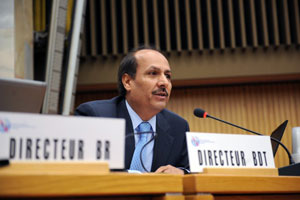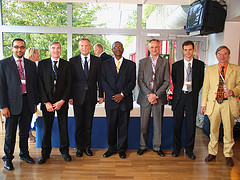|
Geneva, 29 October 2009 |
Not an official record |
N�8 |
|||
| � Previous | |||||
|
Council approves Resolution on ICT and climate
change
The Council approved a Resolution on ICT and Climate Change. It recognizes previous ITU resolutions on this topic, beginning with Resolution 35 at the Kyoto Plenipotentiary Conference in 1994, and ranging through to Opinion 3 of the World Telecommunication Policy Forum (WTPF-09) in April 2009. The new Resolution says that there should be recognition of the importance of telecommunications and ICT in mitigating and adapting to the effects of climate change, as well as the efforts being made by the ITU Sectors and General Secretariat to develop public awareness of this fact. It endorses ITU activities on developing standards for environmentally friendly telecommunications, and instructs the Secretary-General and the Directors of the Bureaux:
The Resolution invites the representatives of Member States at ITU to
liaise with their counterparts responsible for environmental issues, in
order to provide information and develop common proposals related to the
role of ICT in mitigating and adapting to the effects of climate change.
These common proposals would be offered for incorporation into a new
agreement at the United Nations Climate Change Conference in Copenhagen. Council approves Resolution on ITU's role with
regard to international public policy issues concerning creating a
safer Internet environment for children
This new Resolution recognizes the child online protection efforts taking place at the local, national, regional and international levels. It also recognizes the year-long �Call for Action� launched on 18 May 2009 by ITU Secretary-General Hamadoun I. Tour� to consider the period 2009-2010 as the child online safety year. It emphasizes ITU�s commitment to connect the world responsibly to ensure cybersecurity, enable cyberpeace, and protect children online; its role to facilitate the implementation of WSIS Action Line C5 on building confidence and security in the use of ICT. It also stresses the Child Online Protection (COP) as a special initiative within the framework of the ITU Global Cybersecurity Agenda. It notes the agreement reached by participants at the ITU/MIC Strategic Dialogue on "Safer Internet Environment for Children" (Tokyo Communiqu�) on developing a basic framework for achieving safety, promoting voluntary initiatives in the private sector, as well as user-education initiatives. It goes on to note the rapidly changing nature of the information society and the uneven development of child online protection measures and procedures throughout the world and the different risks facing children in different regions.
The Secretary-General is invited to liaise with other United Nations agencies and entities concerned with child online protection in order to develop a global repository with useful, up-to-date information, statistics and tools in this area. In addition, the Resolution instructs the Secretary-General and the Director of the Telecommunication Development Bureau to organize strategic dialogues providing a platform for policy-makers, regulators, industry representatives, research and academia and other relevant stakeholders to exchange views, experiences and best practice on key policy and strategy issues in the area of child online protection. Together, they will inform the World Telecommunication Development Conference on the activities undertaken and on achievements, including new proposals for consideration. The Resolution resolves to establish a Council Working Group on Child Online Protection open to all Member States and Sector Members. The group will exchange views and promote work on child online protection. It will report to the Council annually on its activities. It will also report to the Plenipotentiary Conference in 2010 on the activities undertaken and on achievements, including new proposals for consideration. ITU�s Regional presence
The Council considered a number of documents on the �regional presence�
of ITU; i.e. the operations and effectiveness of its
Regional and Area
Offices. Report by the Joint Inspection Unit (Document 55)
The Joint Inspection Unit (JIU) of the United Nations system had been requested to evaluate the effectiveness of ITU�s regional presence, according to Resolution 25 of the Plenipotentiary Conference in Antalya in 2006. The resulting report was presented for Council�s consideration. The report�s findings are that �some progress has been made in implementing Resolution 25, including better identification of regional priorities, improved information dissemination at regional and national levels, increased assistance to countries in implementing the Doha Action Plan and enhanced cooperation between ITU field offices and relevant regional and international organizations in the areas of telecommunications, development and finance.� However, it adds that �more efforts are needed� particularly as regards the empowerment of the regional offices to make decisions on certain administrative matters and the decentralization of certain responsibilities to facilitate greater autonomy for the regional presence.� The report concludes that �the ITU regional presence continues to be an essential part of the Union,� and that the membership appreciates the activities of the Regional and Area Offices. �However, the human and financial resources allocated to the offices are not commensurate with the increasing number of activities that they are expected to undertake,� the report says. It suggests that �there is a need to streamline and strengthen the existing network of Area Offices by merging some of them and/or providing sufficient human resources.� The JIU also mentions the need for ITU�s Radiocommunication and Standardization Bureaux (BR and TSB) to have more input into the regional presence, in addition to the work of the Telecommunication Development Bureau (BDT). Among the report�s recommendations, the JIU highlights the following five:
Recommendation 2 Recommendation 3 Recommendation 9 Recommendation 17
Analysis of the JIU Report, and comments on the Americas (Document 85)
This contribution from Brazil analyses the JIU�s proposals for restructuring ITU Regional Offices, and the specific ideas for the Americas region. The Brazilian document suggests that there should be debate on whether the Regional Offices �should be allocated within the General Secretariat structure, in order to assure that they are truly intersectoral�. Brazil also proposes increasing human resources and decentralizing decision-making to the regional offices, alongside making appropriate budgetary provisions. In the Americas Region, there are three �one-man� Area Offices (in Barbados, Chile and Honduras) and a Regional Office in Brazil. The Brazilian Administration supports the JIU proposal to merge the Chile office with the Brazil office, and the Barbados office with the one in Honduras.
A regional office for the CIS (Document 82)
This proposal from the Russian Federation is that the Area Office in Moscow should have its status changed to a Regional Office, serving member countries of the Commonwealth of Independent States, and alongside the Regional Office for Europe sited at ITU headquarters in Geneva.
MBG to take action (Document 87)
Turkey submitted the opinion that �the findings of the JIU report shall be dealt with due care and attention� by the ITU management team. To achieve this, it says in Document 87, �MBG could provide guidance in order to allow membership to contribute to the actions taken to fully implement Resolution 25 (Rev. Antalya, 2006).�
Strengthening the regional presence (Document 58)
A status report on BDT�s implementation of Resolution 25 was presented by Yury Grin. It outlines the progress that has been made in such matters as staffing levels, training opportunities and in the use of experts at regional and Area Offices. Planning and assessment of projects is carried out in conjunction with BDT, while the regional and Area Offices take the lead in the identification of their localities� most pressing issues and are directly responsible for the implementation of projects in their respective regions. There are improved working methods, as well as strengthened cooperation with other regional organizations.
Council debate
 All councillors who spoke expressed their great appreciation of the JIU�s work
and its report. The recommendations �require serious consideration,� said
Australia, along with the financial implications. Mali found the JIU report
�detailed, precise and comprehensive,� and emphasized the need to decide on a
mechanism to implement its recommendations. More study is required, as there are
long-term and strategic implications, as well as financial ones, the councillor
said. Tanzania echoed these views and said that the ITU Strategic, Financial and
Operational Plans should include relevant items; Ghana agreed that there must be
improved linkage with planning at headquarters. All councillors who spoke expressed their great appreciation of the JIU�s work
and its report. The recommendations �require serious consideration,� said
Australia, along with the financial implications. Mali found the JIU report
�detailed, precise and comprehensive,� and emphasized the need to decide on a
mechanism to implement its recommendations. More study is required, as there are
long-term and strategic implications, as well as financial ones, the councillor
said. Tanzania echoed these views and said that the ITU Strategic, Financial and
Operational Plans should include relevant items; Ghana agreed that there must be
improved linkage with planning at headquarters.The United States, France and Canada agreed with Mali�s view that further study is needed. Malaysia made the point that decentralization means that �new models� must be found for the regional presence. Cuba, supported by Spain, emphasized that the regional presence, from the very beginning, had development activities as its only focus � and all human and financial resources are from BDT. In addition, Cuba said that, because of the wide-ranging implications, the JIU report should be circulated beyond the Council, to all ITU Member States. On specific regional concerns, Ukraine supported the proposal on a CIS Regional Office, outlined in Document 82. Australia supported JIU�s idea of creating an Area Office for the Pacific region (paragraph 47 of the JIU report), especially to assist small island developing States. For the Americas, concern was expressed, by Argentina and others, about the proposal to merge the Barbados and Honduras offices, because of the linguistic and cultural diversity of the central American and Caribbean sub-regions; also, removing an office from the Caribbean could present practical problems for the developing countries there. BDT Director Sami Al Basheer Al Morshid thanked the JIU for a comprehensive report and very clear recommendations (especially the five highlighted). He emphasized that since the new team of Elected Officials had taken office, significant improvements had been made to the regional presence in terms of structure and working methods. Mr Al Basheer added that they would ensure, while bearing in mind the budgetary constraints, that there is follow-up action on those recommendations that might not yet have been implemented. ITU Secretary-General Hamadoun Tour� concluded the discussion by thanking the JIU for �a very sound report�. He told the Council that �we have a real opportunity to get this issue resolved�, having had improvement of ITU�s regional presence on the agenda for so long. He said that ITU would report to Council 2010 with a practical strategy for implementation of the JIU recommendations. "We will already begin implementing those resolutions which do not have budgetary implications," the Secretary-General also said. Meanwhile, the JIU report will be circulated to all Member States, as requested. The Council endorsed the JIU report, and took note of the issues in Documents 82, 85 and 87. It asked the secretariat to take steps to provide proposals to Council 2010 (and later to PP-10) on a detailed mechanism of implementation.
Report of the Expert Group on review of the
International Telecommunication Regulations
The secretariat introduced the Report of the Expert Group on review
of the International Telecommunication Regulations (Document 6). The
Plenipotentiary Conference in Antalya approved Resolution 146 calling
for a review of the International Telecommunication Regulations (ITR).
This Resolution also calls for a World Conference on International
Telecommunications (WCIT) to be convened in Geneva in 2012, at which the
ITR will be reviewed. It instructs the ITU Council to adopt by 2011 the
agenda and exact dates for holding a WCIT.
Council Working Group on the participation of all relevant stakeholders in the activities of the union related to WSIS (Document 59)
Themes for the World Telecommunication and Information Society Day of 2010 and 2011
World Telecommunication and Information Society Day 2010 will be
celebrated at Expo 2010 in Shanghai, China. The theme of the Expo is
�Better City, Better Life�. The Council in 2008 had approved "ICTs for a
better life for all" as the theme for World Telecommunication and
Information Society Day 2010. However, to better align this theme with
that of the Expo 2010 Shanghai and provide a clear message on the role
of information communication technologies for better cities, the
secretariat proposed that the Council amend the theme approved in 2008.
The Council approved these themes.
Connect the World initiative
 Fernando Lagra�a of BDT presented
Document 27 (Rev.2) on the
Connect the World
initiative, which was launched in 2005 to help mobilize resources to implement
WTDC and WSIS outcomes. He informed the Council that a series of regional summits is
being organized to bring together committed stakeholders to strengthen existing
partnership initiatives for ICT investment, as well as to launch new ones. The
Connect Africa Summit, held in Kigali, Rwanda in October 2007, was the first in
this series. As part of its follow-up to Connect Africa, ITU launched
new partnerships in 2008, including the two examples below: Fernando Lagra�a of BDT presented
Document 27 (Rev.2) on the
Connect the World
initiative, which was launched in 2005 to help mobilize resources to implement
WTDC and WSIS outcomes. He informed the Council that a series of regional summits is
being organized to bring together committed stakeholders to strengthen existing
partnership initiatives for ICT investment, as well as to launch new ones. The
Connect Africa Summit, held in Kigali, Rwanda in October 2007, was the first in
this series. As part of its follow-up to Connect Africa, ITU launched
new partnerships in 2008, including the two examples below:
Connect CIS Summit Global Flagship Initiatives
The Council noted Document 27 (Rev.2) Report of the Council Working Group on the Strategic and Financial Plans for 2012-2015 (Document 103)
The Chairman of this group, Italy�s Fabio Bigi, presented his report
in Document 103. The group is open to Member States and, when addressing
the draft Strategic Plan, also to Sector Members. Mr Bigi reported that
the group had held two meetings and approved its working methods and an
�Outline of the Draft Structure and Format for the Strategic Plan�. A
SharePoint portal
has been set up to support the work of the group.
Access to the discussion materials require registration to the portal,
which can be obtained by sending an email to
strategy@itu.int. Since Council 2008, five �entities dealing with telecommunication matters� requested to become Sector Members and three to become Associates (see tables). The Secretary-General accepted to provisionally include these entities in the lists of Sector Members and Associates. The Council confirmed the action taken by the Secretary-General.
Request for exemption from any financial contribution to
defraying expenses relating to participation in the work of the ITU
A request from the Caribbean Broadcasting Union (CBU) for exemption was approved by the Council on the basis of mutual advantages for ITU and CBU. CBU was formed in 1970 with a view to stimulating the flow of broadcast material among the Radio and Television systems in the Caribbean region. Its membership includes representatives from Latin America and the Caribbean, North America and Europe. Some of its members are also members of ITU, including most international broadcasting organizations. CBU is the only Pan-Caribbean medium, reaching over 4.8 million people in that region. ITU participates regularly in its meetings. Another advantage is that ITU could participate in CBU�s Annual General Assembly free of charge. ITU has previously received relevant documentation from CBU and there has been good collaboration in terms of exchange of information. CBU could bring a unified Caribbean broadcasting perspective to ITU.
|
|||||




